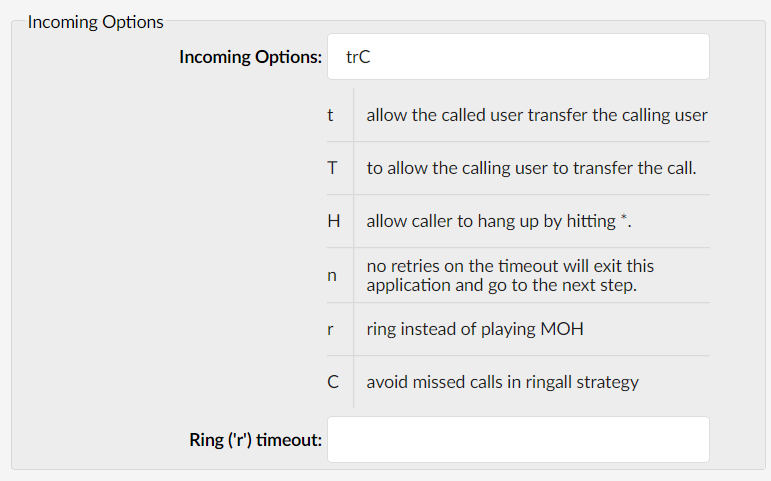Ring Group / Call Q Dial Options
Dial Options are additional Pre-fixes that can be assigned to extensions such as Ring groups and Queues to effect how the calls are processed.
Multiple Dial options can be combined, for example a common dial option for a queue group is:
A breakdown of what is happening here is:
t – this prefix allows the person to transfer the call to another party by pressing the # key.
r – generates a ringtone for the person calling into the queue
C – Reset the CDR (Call Detail Record) for this call, this will cause the handsets to not receive a missed call indication from this group.
Possible Dial Options:
- t – Allow the called user to transfer the call by hitting #
- T – Allow the calling user to transfer the call by hitting #
- r – Generate a ringing tone for the calling party, passing no audio from the called channel(s) until one answers.
- R – Indicate ringing to the calling party when the called party indicates ringing, pass no audio until answered. This is available only if you are using kapejod’s bristuff.
- m – Provide Music on Hold to the calling party until the called channel answers. This is mutually exclusive with option ‘r’, obviously. Use m(class) to specify a class for the music on hold.
- o – Restore the Asterisk v1.0 Caller ID behavior (send the original caller’s ID) in Asterisk v1.2 (default: send this extension’s number)
- j – Asterisk 1.2 and later: Jump to priority n+101 if all of the requested channels were busy (just like behaviour in Asterisk 1.0.x)
- M (x) – Executes the macro (x) upon connect of the call (i.e. when the called party answers)
- h – Allow the called party to hang up by dialing *
- H – Allow the caller to hang up by dialing *
- C – Reset the CDR (Call Detail Record) for this call.
- A (x) – Play an announcement (x.gsm) to the called party.
- S (n) – Hang up the call n seconds AFTER the called party picks up.
- f – forces callerid to be set as the extension of the line making/redirecting the outgoing call. For example, some PSTNs don’t allow Caller IDs from other extensions than the ones that are assigned to you.
Have more questions? Submit a request
